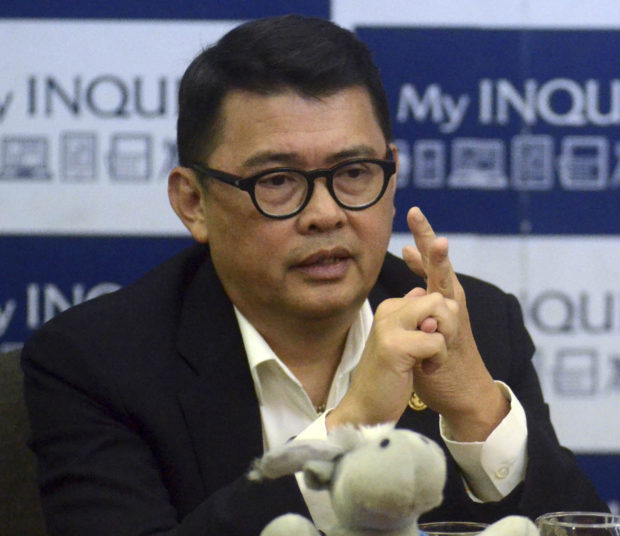
Presidential Adviser for Entrepreneurship Joey Concepcion. (File photo from Philippine Daily Inquirer)
Private companies and some local governments have received their money back after their orders for as many as 8 million doses of Bharat Biotech’s Covaxin encountered supply problems.
Presidential Adviser for Entrepreneurship Joey Concepcion said the Philippine buyers were also told that the soonest that the vaccines manufactured in India would arrive was early next year.
“If there’s any, there could be 1 or 2 million (deliveries) in October, but the bulk would have to come next year, first quarter. Not (entirely) useless, but that would be a little late already,” Concepcion said.
In a phone interview on Thursday, Concepcion said the refund was made a couple of weeks ago, but he did not disclose the amount or the names of the companies and local government units (LGUs) that placed the orders.
He said he knew about it because he helped endorse the people interested in ordering or making reservations to the local emergency use authorization (EUA) holder or distributor.
Food and Drug Administration chief Eric Domingo, in a text message, said Covaxin was issued an EUA in June and the authorization was given to IP Biotech.
In a statement on Thursday, National Task Force Against COVID-19 (NTF) chief Secretary Carlito Galvez Jr. added that Covaxin has yet to secure a recommendation from the Department of Health-Health Technology Assessment Council, a requirement under the COVID-19 Vaccination Program Act of 2021.
Galvez said the procurement process for Covaxin was also unlike those for Moderna and AstraZeneca because the former required intermediaries.
Pricing concerns
He did not identify who these intermediaries were, but said the national government did not entertain such go-betweens as they tended to only complicate and muddle the negotiations.
Galvez, who earlier expressed concerns about potential overpricing of Covaxin, said: “The question is why do we have to go through intermediaries? It will create a lot of questions on the pricing because we involve more players.”
He added, “Hindi po transparent ang parties involved. So they’re signing a negotiation with the LGUs, and they’re asking for advance commitment na wala po sa law ’yan. Dapat kasama ang NTF sa negotiation.”
In a text message, Bhatia said that the company could not immediately comment, “as much as we would like to share our side of story.” “We have signed NDAs (nondisclosure agreements) and would not wish to violate those terms,” he said.
Galvez said the NTF was only observing due diligence and denied putting on hold LGUs’ orders through the multiparty agreements with manufacturers and the national government.
But in a series of Facebook and Twitter posts on Thursday, Cavite Gov. Jonvic Remulla said he was “beyond frustrated” by the national government’s slow action on local government’s orders.
“We’ve had a number of meetings but every time we ask for vaccine support the answer is ‘we will get back to you.’ It has always been like that. It is worse than ‘noted,’” Remulla said.
He said Cavite allotted P2.5 million in local funds to buy Novavax for 1.25 million people.
Remulla said he was informed that Cavite’s order was pushed back to December.
Mayors in some third-and fourth-class municipalities in southern Luzon also said their supposed orders in January through a nongovernment initiative for AstraZeneca did not push through as well.
Supply allocation
One mayor said they were told the supply was already exhausted, while another said he had not heard anything about it since.
“No news about that anymore. Besides, we already used up the (vaccine) funds for the ayuda (aid),” the second mayor said.
In Malacañang, presidential spokesperson Harry Roque said on Thursday that other regions were set to get more doses now that nearly half of eligible Metro Manila residents have been inoculated against COVID-19.
He gave the assurance in response to Remulla’s complaint that his province has not been getting enough doses despite having one of the highest number of cases.
Roque said Remulla’s wish has been granted.
“The government has been planning that now that Metro Manila is close to vaccinating 50 percent [of its eligible population]. Most of the doses would be sent to nearby provinces, the plus areas, as well as the places experiencing a surge,” he said at a press briefing. The NCR Plus includes the provinces of Cavite, Laguna, Rizal and Bulacan.
Booster shots budget
He said Region 4A, which includes Cavite, would receive 3.8 million doses in September.
In the fourth quarter of the year, it would receive the biggest allocation among regions at 17.475 million doses.
“We expect the plus areas to catch up with Metro Manila,” he added.
After Region 4A, the next biggest allocation would be for Region 3, which would get almost 17 million doses, Roque said.
At a hearing in Congress, some legislators on Thursday sought to set aside funding for booster shots in next year’s proposed P5.02-trillion national budget.
Marikina Rep. Stella Luz Quimbo asked Department of Budget and Management Officer in Charge Tina Rose Marie Canda why the P45-billion funding for boosters was included only in the unprogrammed appropriations.
Unlike regular budget items, unprogrammed appropriations could be funded only by excess revenues or additional foreign borrowings.
Canda replied that the Inter-Agency Task Force for the Management of Emerging Infectious Diseases has yet to decide at this point if booster shots would be a requirement next year.
Finance Secretary Carlos Dominguez III told reporters that the 2022 budget proposal already included an item for booster shots in case these would be needed and that “funding for this item is already available.”
Iloilo Rep. Janette Garin, a former health secretary, also expressed concern that booster shots were not treated as priority expenditures for next year. —With a report from Ben O. de Vera